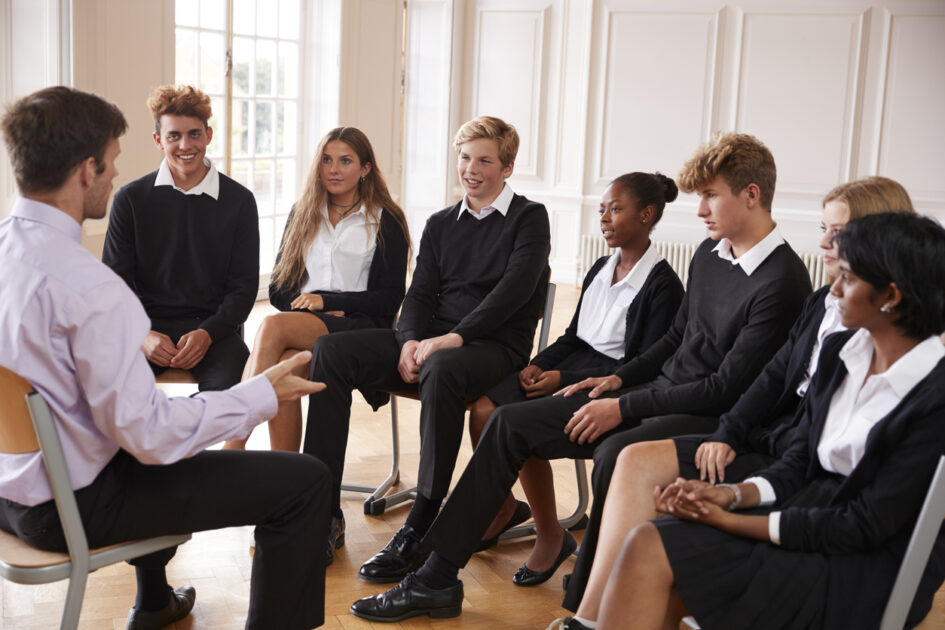How can I make my school a safe space for LGBTI+ students?
By making simple changes you can create an inclusive environment for everyone

It is important that our schools are inclusive and safe spaces for everyone regardless of a person’s sexual orientation, gender identity, gender expression and sexual characteristics. Both as LGBTI+ young people and as allies it is our duty to try and create an environment in our schools that is accepting and encouraging of LGBTI+ students so that everyone has the opportunity to participate fully in their education and social lives during school. Below are some ways in which you make your school a safer space for LGBTI+ people
How to make your school inclusive of LGBTI+ students
Show respect
Respecting others is the first step to creating a safe environment in schools for LGBTI+ people. Respecting one another means listening to one another, being considerate of each others privacy and treating everyone with dignity. Regardless of our openness about our sexual orientation or gender identity it is important not to pressure others around us to be open about theirs. Both sexual orientation, gender identity, gender expression and sexual characteristics are extremely personal matters and no one should be “outed” before they are comfortable doing so themselves. It is also important not to assume we deserve to know other people’s personal details. This means not asking LGBTI+ people questions that wouldn’t be asked of cis-straight or people who are not LGBTI+.
Call out homophobic, biphobic, transphobic, interphobic, queerphobic and acephobic language
The language we use can have an immense effect on those around us. Although it may not always be intentional our language can have a negative impact on others if we are not careful in what we say. If we hear others in our schools using language which is homophobic, biphobic, transphobic, interphobic (against intersex people), queerphobic and acephobic (against asexual people) it is important to address it in a constructive way.
It is also important to address people by their correct pronouns, eg he, she or they. If a person in your school is transitioning, addressing them by their correct pronouns and name is an important way to support them during this process. It can at times be difficult to get use to addressing a person in a certain way that we are not used to. Making mistakes when using someones pronouns or name is part of the learning process and it is important to make a big effort. If someone intentionally continues to use the previous name and pronouns of a trans person this is bullying and should not be accepted in school.
Start LGBTI+ and Allies groups
An ally is someone who is a advocate and/or activist for LGBTI+ people. Creating ally groups in school shows LGBTI+ students the acceptance and support available and creates an environment which is safe for other LGBTI+ to express themselves and their gender or sexual identity.
Ways in which we can be allies include:
- Asking how a person would like to be spoken to/referred to, and respect those terms
- Not asking ‘when did you become gay’ or ‘when did you become a woman’
- Instead the question could be ‘when did you come out to others?’
- Trying not to assume someone’s gender identity or sexual orientation
If you are an LGBTI+ young person and want to make your school a supportive environment for other LGBTI+ students talk to your guidance counsellor about starting an LGBTI+ group or club in the school.
Avoid using binary language whenever possible
Avoiding binary language means that we avoid addressing people as male or female where possible. This may seem like a challenge to begin with as we are used to addressing people using binary language, but small changes to the words we use can make a big difference for transgender and non-binary people by helping them feel more included in schools. For example when giving a presentation and addressing a group instead of saying “ladies and gentlemen” you could say “classmates” or “friends”
Ask your school to participate in awareness days
Ask your guidance teacher if your school can participate in LGBTI+ awareness days such as International Transgender Day of Visibility, Intersex Awareness Day and Bi Visibility Day. Although Pride week falls during the summer months, why not host your own Pride week at a different time during the school year to highlight the importance of LGBTI+ people within the school’s community?
Put up posters for LGBTI+ support groups and hotlines
Help inform LGBTI+ students of the support services available to them by hanging posters around the school for LGBTI+ support services such as BeLonG To, Teni, LBGT Ireland and ShoutOut.
Ask to organise workshops
Ask your guidance counsellor if you can organise speakers to come and talk about supporting LGBTI+ people. ShoutOut is a charity working on the island of Ireland to end the exclusion of LGBTI+ people by providing free workshops for students, teachers, parents and guardians. If you would like to request a workshop from ShoutOut for your school click here. SpunOut.ie’s OutReach and Training Officer KiKi Martire also gives workshops in schools on LGBTI+ inclusion. If you would like to organise a workshop with SpunOut.ie click here.
Be inclusive in sport
Often in mixed schools, during P.E the class can be divided by gender for different teams or sports. Advocate on the behalf of non-binary and transgender classmates to play with mixed teams or non-binary teams. If your teams are divided by gender help to ensure that transgender and non-binary classmates feel included with their preferred team.
Advocate for gender neutral bathrooms and changing areas
Gender neutral bathrooms and changing areas allow those who do not want to define their gender or do not feel comfortable using gender specific bathrooms to still participate fully in their education. Advocating for gender neutral bathrooms and changing areas shows LGBTI+ students the support and acceptance there is for them in the school.
Interested in learning more about LGBTI+ issues? Click here.
Need more information?
We are here to answer your questions and talk through your options. Our online chat service is for 16 to 25 year olds and is available Monday to Friday, 4pm to 8pm. Chat to us now about your situation.
- Chat now to a trained Youth Information Officer
- Or leave us a message and we will email you back






